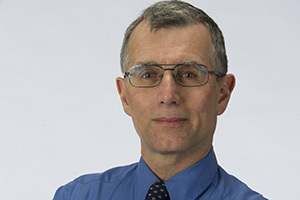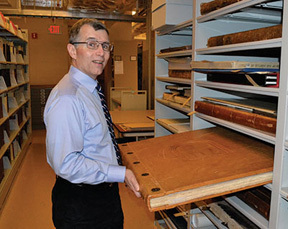Alumni Spotlight: Louis Jordan
The Medieval Institute is pleased to present our spring 2018 Alumni Spotlight. In this series we feature the career paths of Institute alumni. Look for a new installment each semester, and follow our weekly news features regarding Medieval Institute-supported programming, events, guest lectures and general medievalist news on our news and events feed webpage.

This semester, we're highlighting the career and insights of Louis Jordan, librarian with the University of Notre Dame for over thirty years. Dr. Jordan graduated from the Medieval Institute in 1980 with a dissertation on the iconography of death personified in western medieval art under the direction of the renowned scholar Bernard McGinn. In recent years, he has focused on integrating library services and collections into the teaching and research missions of Notre Dame. He is also an elected member of the Comité international de paléographie latine and a fellow of the American Numismatic Society. Currently, Dr. Jordan is Associate University Librarian of the Hesburgh Libraries at Notre Dame. We asked him to share with us his journey from MI grad to veteran library administrator at one of the top twenty-five research universities in the United States.
Dr. Jordan, please tell us a little about where your career has taken you since graduating from the MI.
I graduated from the Medieval Institute thirty-seven years ago and soon thereafter started working for the University of Notre Dame Libraries. Over the years I held positions as the Medieval Institute Librarian, Subject Specialist for several humanities areas, Head of the Department of Rare Books and Special Collections, and now, as a library administrator I am in charge of the division of Academic Services and Collections.
What’s the biggest change you’ve seen in Medieval Studies or your particular career field in the past ten years?
University libraries are undergoing a transformation. Whereas in past generations the role of the library revolved around building collections and providing reference services, today the focus is widening and has begun to emphasize integrating both the library collections and library faculty into the teaching and research programs of the university. This is happening nationwide and is also true at Notre Dame. I notice that both summer courses in the Medieval Institute in 2017 were taught by librarians, Dave Gura from Rare Books and Federico Gallo from the Biblioteca Ambrosiana. A growing number of Notre Dame library faculty teach semester courses or assist in team-teaching a course, while the majority of library faculty within the academic services and collections division make numerous class presentations each semester.

What advice would you have for current grad students who would like to follow your career track?
Libraries continue to provide scholarly resources to the academic community. With many electronic products acquired as part of large package deals and significant numbers of print books arriving through approval plans, humanities subject selectors spend more time acquiring and processing manuscript, archival and rare items that will enhance our research capabilities. These items are used in teaching, exhibited in Special Collections, digitized and described in online presentations. The proliferation of electronic databases also requires one to keep abreast of digital resources and to ensure we have subscriptions to the best research tools available. A thorough working knowledge of these resources is also required to help provide research assistance to scholars.
How do you think an interdisciplinary degree from the MI would aid someone interested in becoming a library professional?
Many libraries are now looking for individuals with advanced degrees and specialized skills. In several instances, scholars holding a Ph.D. are not required to have a library science degree, although such a degree is very useful for advancement. The area with the most openings nationwide relates to humanists with ability in digital humanities, such as advanced text mining, data visualization, and related skills such as digital mapping. Candidates with proficiencies in these areas who also demonstrate interdisciplinary subject expertise have a distinct advantage. Language skills are also useful, particularly for those looking to work in cataloging or seeking a position as a collections curator in Rare Books and Special Collections.
Another option for scholars entering the library workforce is taking on the role of a subject specialist. Medievalists frequently apply for positions in Classics, History, English, and Theology as well as any language or subjects in which they hold specializations. Typically these jobs entail selecting resources both print and digital, assisting scholars with research, teaching class sessions, and working closely with the digital scholarship and the rare books teams.
Over the years I have worked with several Notre Dame Ph.D. students who have pursued library careers. Among them are Charles Spornick (Medieval History), Head of Collection Management at Emory; Christian Dupont (Theology), Director of Special Collections at Boston College; Ben Panciera (A.B.D., Medieval Institute), Director of Special Collections at Connecticut College; David Morris (History), Classics and Medieval Studies Subject Specialist at University of Illinois at Urbana-Champlain; Marina Smyth (Medieval Institute), Medieval Studies Librarian Emerita; and Julia Schneider (Medieval Institute), the current Medieval Studies Librarian. Don Brower, who works in the Notre Dame Library Digital Infrastructure team, has a Ph.D. from our math department. The Notre Dame University Libraries have also hired several Ph.Ds from other universities, including David Gura, Julie Tanaka, and Erika Hosselkus in Special Collections; William Kevin Cawley in Archives; Dan Johnson, James Ng and Matt Sisk in the Center for Digital Scholarship; Rachel Bohlmann and Jessica Kayongo in Collection Strategy and Subject Services; Rob Kusmer in the Strategic Resources Discovery Team, (i.e. cataloging); and Randy Harrison, our Emerging Technologies Librarian. I suspect any of these librarians would be willing to discuss a library career track.